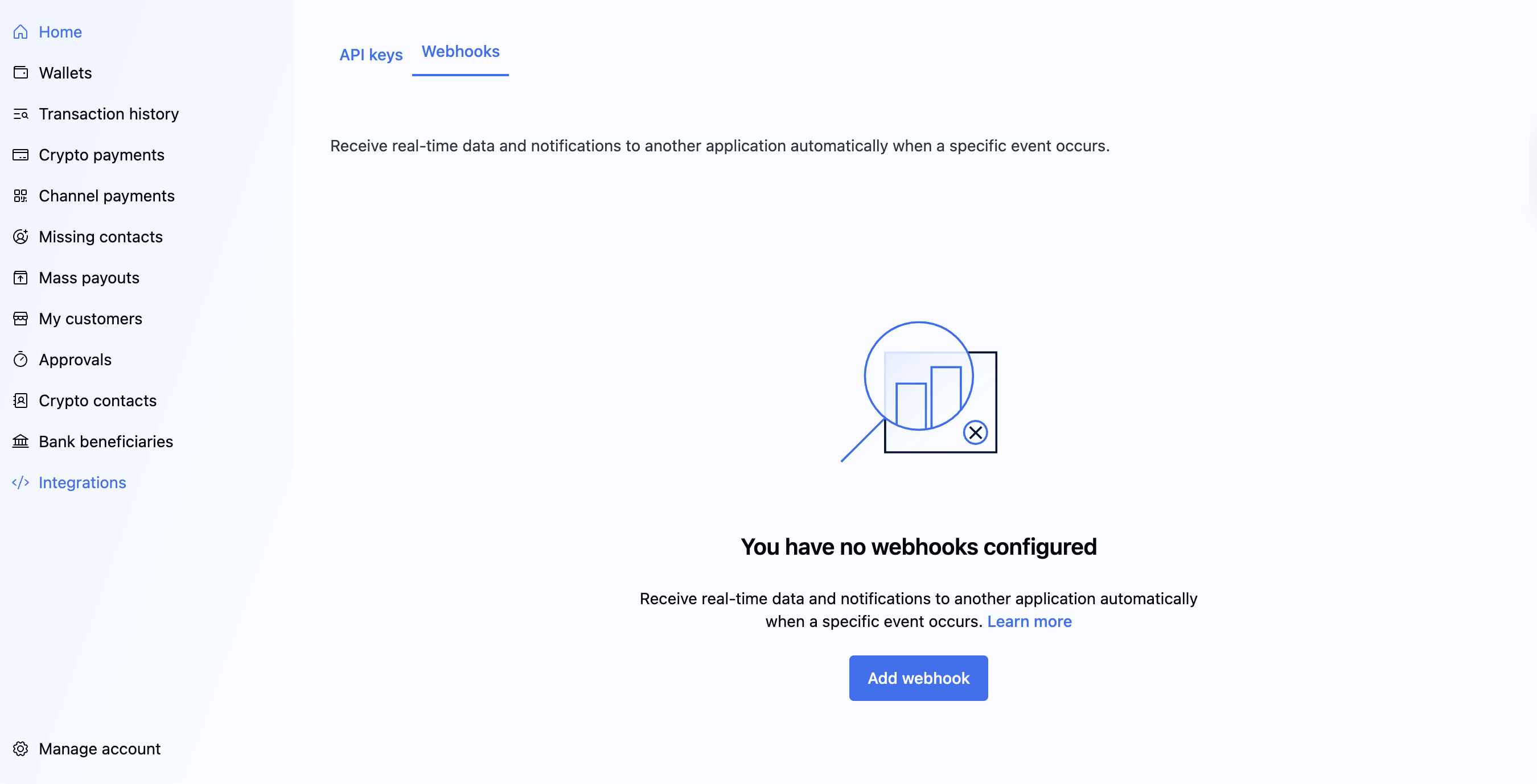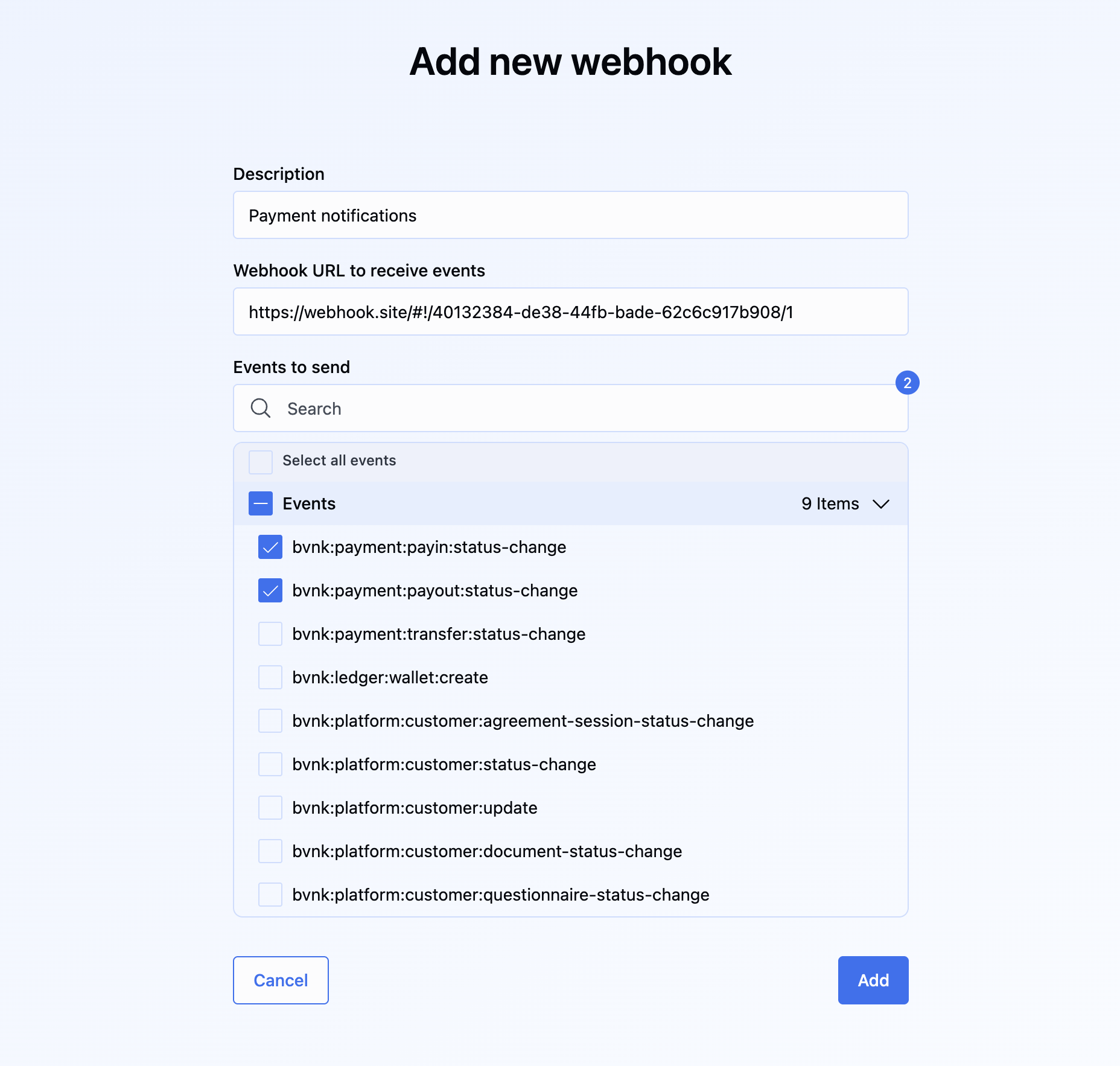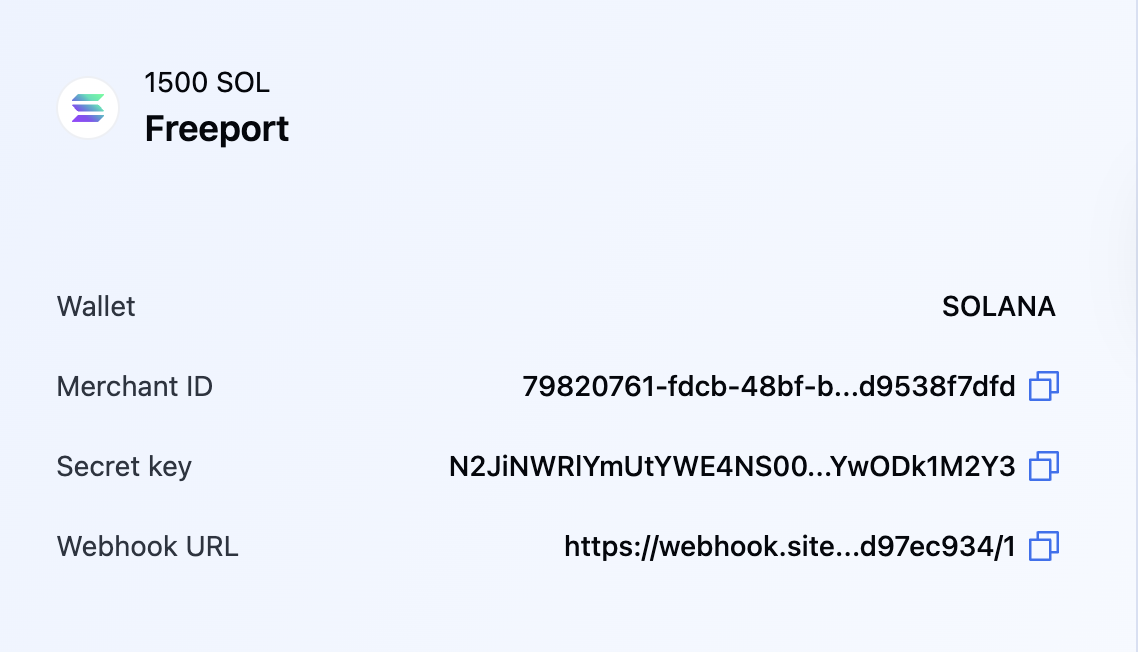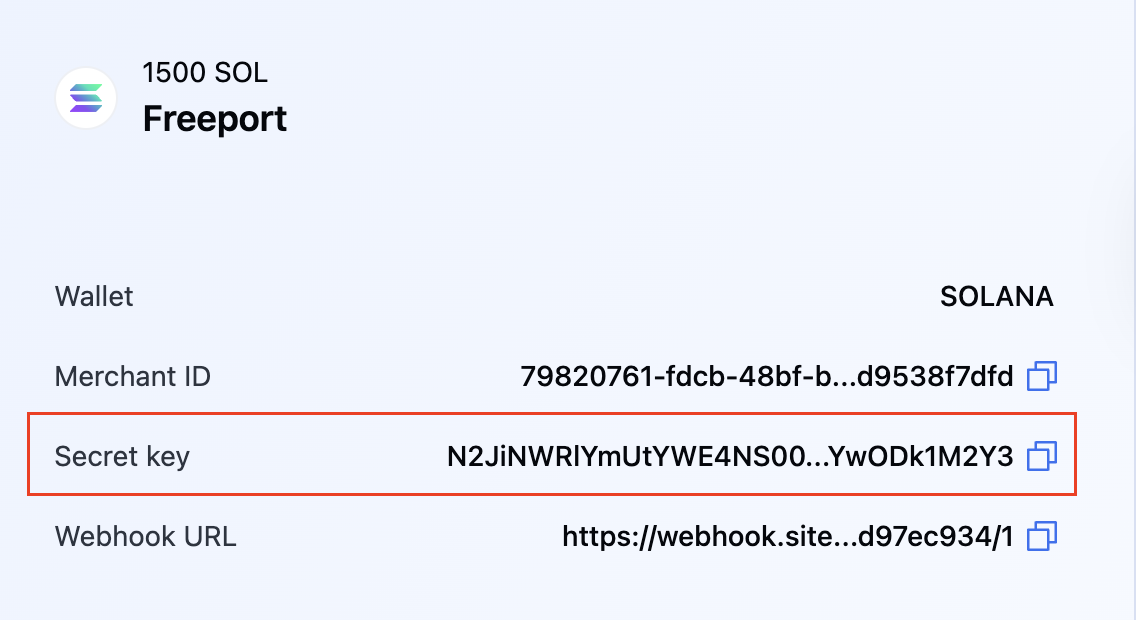Receive Webhook Notifications
The webhook feature ensures that you are automatically informed about changes to your BVNK account and minimises the requirement for you to ask for assistance in configuring your required webhook setup.
You can configure real-time notifications via webhooks for key events such as: pay-ins received, payouts sent out, refund initiated, and transaction status changed.
The most significant benefit for you is the ability to automate your workflows by setting up triggers that determine which operations or activities to perform upon receiving a deposit.
For example, if you run a business that issues wallets to customers and these customers make deposits to fund their wallets, you can automatically credit their wallets as soon as you receive the webhook for the successful deposit. This eliminates the need for a manual process of periodically checking the BVNK Portal to confirm deposits.
Create webhooks
To create a webhook, do the following:
-
Log in to the BVNK Merchant Portal.
-
On the sidebar, click Integrations, go to the Webhooks tab, and click Add webhook.

-
In the Add new webhook dialogue, specify the following webhook settings:
- Description: Provide a short, meaningful description for the webhook.
- Webhook URL to receive events: Enter the Webhook URL to which the events will be sent.
- Events to send: Select the events to send from the list provided.

Here, you can select events for operations related to fiat and crypto.
-
Click Add.
The new active webhook appears in the list of webhooks. Now you can do the following:
- List destinations of webhook URLs.
- Create a destination of webhook URLs.
- Remove the destination of webhook URLs.
- List events when creating a destination or viewing details.
Once your payment has been processed, you will receive an asynchronous response (webhook) containing the details of the event to which you subscribed. This response will be sent to the Webhook URL described earlier.
Also, see a product demo or read more in the Help Centre article.
For the detailed description of webhooks and their fields, see the Webhook Reference.
Create webhook listener
BVNK sends webhooks for changes on transactions and other entities, so it's a good idea to set up a listener in your service to get the most out of our Payments API.
You can specify your Webhook URL during the creation of a Merchant. To add or change the webhook URL for an existing Merchant, go to the Merchant menu, click Edit, and enter the required address. After you click Save, the Webhook URL will be added along with the generated Secret key.
Click the Merchant's name to see the changes:

Webhooks are sent as an HTTP POST with Content-Type: application/json containing the payload of the object.
Important notes
- Always check the status of the payment on the API after you receive a webhook, as further details may be required, such as the final amount paid for the transaction about which you have been notified.
- After you receive the final webhook from BVNK, do not update transactions in your system to prevent duplicate transaction IDs from affecting your customers
Acknowledge events
BVNK expects the 200 status code upon receipt of a successfully sent webhook.
If your webhook script performs any logic after receiving a webhook, to prevent timeouts, you should return a 200 status code before completing the logic.
Webhook retry policy
If BVNK does not receive a 200 status code, the webhook retry policy will kick in.
The retry policy adds a delay before each retry, starting with a base delay and increasing the time between retries. The delay grows larger after each attempt, but will not exceed 15 minutes. The system will attempt up to 100 times, and after that, no further retries will occur.
Handle duplicate events
Callback endpoints might occasionally receive the same event more than once. We advise you to guard against duplicate event receipts. One way to do this is to log the events you’ve processed and then exclude the logged ones from further processing.
Validate webhooks
The webhook also contains a signature to allow servers to verify the authenticity of the request using a server-side secret key. The key is displayed in the field Public Key when you create the hook. The signature is present in the headers as the x-signature header.
To calculate the signature, do the following:
- Get the payload of the webhook.
- Obtain the secret key: go to Manage Account > Manage Merchants, and click a Merchant Name to open its details.

- Generate the signature using the Secret Key and payload components. See the examples for different languages below.
Some legacy webhooks may still require concatenation of the following items to create a signature:
- Webhook URL
content-type- Webhook payload
Note that these webhooks will be soon discontinued.
import javax.crypto.Mac;
import javax.crypto.spec.SecretKeySpec;
import java.util.Arrays;
public class Main {
public static void main(String[] args) throws Exception {
// Secret key from webhook configuration (used as string directly, not Base64 decoded)
String secretKey = "JUL5QkQrpZYwW+Kf03QSrb70CG+ea/j8E/JfslENaXhd0AGBDbAtYYP2MdjkYDqiwjBtrtQXsUIbtAf7IGEGfg==";
// From X-Signature header
String signatureBase64 = "VWEtiJu/7dLrq0ZtXS0HbGDPy6Re86oZeTnEEc9mlxg=";
// Compact JSON payload (no spaces/newlines) - this is what the hook service signs
String payload = "{\"event\":\"bvnk:ledger:report:ready\",\"eventId\":\"0198a8bb-7d56-79ef-92b2-2aed247c21b4\",\"timestamp\":\"2025-08-14T13:18:36.374620938Z\",\"data\":{\"id\":\"8d942264-e27e-44d9-a048-5ed66ac5129f\",\"url\":\"https://bvnk-staging-reports.s3.eu-west-1.amazonaws.com/transaction/8d942264-e27e-44d9-a048-5ed66ac5129f_7b2f87b9-1335-4b1e-bbeb-6a59ba1dc6df.csv?X-Amz-Algorithm=AWS4-HMAC-SHA256&X-Amz-Date=20250814T131836Z&X-Amz-SignedHeaders=host&X-Amz-Credential=AKIAZP6R7NJUFAGFGMNA%2F20250814%2Feu-west-1%2Fs3%2Faws4_request&X-Amz-Expires=604800&X-Amz-Signature=5c861e552b3e253be28f8e02c818b3c5e00269b9b50b6d4957d5281825d31a67\",\"type\":\"TRANSACTION\",\"status\":\"READY\"}}";
// Use secret key as UTF-8 bytes directly (as hook service does)
byte[] secretKeyBytes = secretKey.getBytes("UTF-8");
SecretKeySpec secretKeySpec = new SecretKeySpec(secretKeyBytes, "HmacSHA256");
// Initialize HMAC signature verification
Mac mac = Mac.getInstance("HmacSHA256");
mac.init(secretKeySpec);
// Generate signature for the payload
byte[] computedSignature = mac.doFinal(payload.getBytes());
String computedSignatureBase64 = java.util.Base64.getEncoder().encodeToString(computedSignature);
// Decode received signature
byte[] receivedSignature = java.util.Base64.getDecoder().decode(signatureBase64);
// Verify signatures match
boolean verified = Arrays.equals(computedSignature, receivedSignature);
System.out.println("Expected signature: " + computedSignatureBase64);
System.out.println("Received signature: " + signatureBase64);
System.out.println("Signature is valid: " + verified);
}
}#!/usr/bin/env python3
"""
BVNK Webhook Signature Verification - Python
This script verifies HMAC-SHA256 signatures from BVNK webhook payloads.
"""
import hmac
import hashlib
import base64
def verify_webhook_signature(secret_key, payload, signature_base64):
"""
Verify HMAC-SHA256 signature for webhook payload
Args:
secret_key (str): The shared secret from webhook configuration
payload (str): The JSON payload as received in webhook
signature_base64 (str): The signature from X-Signature header
Returns:
bool: True if signature is valid, False otherwise
"""
# Convert secret key to bytes using UTF-8 encoding
secret_bytes = secret_key.encode('utf-8')
# Convert payload to bytes using UTF-8 encoding
payload_bytes = payload.encode('utf-8')
# Generate HMAC-SHA256 signature
computed_signature = hmac.new(
secret_bytes,
payload_bytes,
hashlib.sha256
).digest()
# Base64 encode the computed signature
computed_signature_base64 = base64.b64encode(computed_signature).decode('ascii')
# Decode the received signature
received_signature = base64.b64decode(signature_base64)
# Compare signatures using constant-time comparison
return hmac.compare_digest(computed_signature, received_signature)
def main():
# Secret key from webhook configuration (used as string directly)
secret_key = "JUL5QkQrpZYwW+Kf03QSrb70CG+ea/j8E/JfslENaXhd0AGBDbAtYYP2MdjkYDqiwjBtrtQXsUIbtAf7IGEGfg=="
# From X-Signature header
signature_base64 = "VWEtiJu/7dLrq0ZtXS0HbGDPy6Re86oZeTnEEc9mlxg="
# Compact JSON payload (no spaces/newlines) - this is what the hook service signs
payload = '{"event":"bvnk:ledger:report:ready","eventId":"0198a8bb-7d56-79ef-92b2-2aed247c21b4","timestamp":"2025-08-14T13:18:36.374620938Z","data":{"id":"8d942264-e27e-44d9-a048-5ed66ac5129f","url":"https://bvnk-staging-reports.s3.eu-west-1.amazonaws.com/transaction/8d942264-e27e-44d9-a048-5ed66ac5129f_7b2f87b9-1335-4b1e-bbeb-6a59ba1dc6df.csv?X-Amz-Algorithm=AWS4-HMAC-SHA256&X-Amz-Date=20250814T131836Z&X-Amz-SignedHeaders=host&X-Amz-Credential=AKIAZP6R7NJUFAGFGMNA%2F20250814%2Feu-west-1%2Fs3%2Faws4_request&X-Amz-Expires=604800&X-Amz-Signature=5c861e552b3e253be28f8e02c818b3c5e00269b9b50b6d4957d5281825d31a67","type":"TRANSACTION","status":"READY"}}'
# Verify the signature
is_valid = verify_webhook_signature(secret_key, payload, signature_base64)
# For debugging - compute expected signature
secret_bytes = secret_key.encode('utf-8')
payload_bytes = payload.encode('utf-8')
computed_signature = hmac.new(secret_bytes, payload_bytes, hashlib.sha256).digest()
expected_signature_base64 = base64.b64encode(computed_signature).decode('ascii')
print(f"Expected signature: {expected_signature_base64}")
print(f"Received signature: {signature_base64}")
print(f"Signature is valid: {is_valid}")
if __name__ == "__main__":
main()<?php
/**
* BVNK Webhook Signature Verification - PHP
* This script verifies HMAC-SHA256 signatures from BVNK webhook payloads.
*/
/**
* Verify HMAC-SHA256 signature for webhook payload
*
* @param string $secretKey The shared secret from webhook configuration
* @param string $payload The JSON payload as received in webhook
* @param string $signatureBase64 The signature from X-Signature header
* @return bool True if signature is valid, false otherwise
*/
function verifyWebhookSignature($secretKey, $payload, $signatureBase64) {
// Generate HMAC-SHA256 signature using the secret key as UTF-8 bytes
$computedSignature = hash_hmac('sha256', $payload, $secretKey, true);
// Base64 encode the computed signature
$computedSignatureBase64 = base64_encode($computedSignature);
// Decode the received signature
$receivedSignature = base64_decode($signatureBase64);
// Compare signatures using constant-time comparison
return hash_equals($computedSignature, $receivedSignature);
}
function main() {
// Secret key from webhook configuration (used as string directly)
$secretKey = "JUL5QkQrpZYwW+Kf03QSrb70CG+ea/j8E/JfslENaXhd0AGBDbAtYYP2MdjkYDqiwjBtrtQXsUIbtAf7IGEGfg==";
// From X-Signature header
$signatureBase64 = "VWEtiJu/7dLrq0ZtXS0HbGDPy6Re86oZeTnEEc9mlxg=";
// Compact JSON payload (no spaces/newlines) - this is what the hook service signs
$payload = '{"event":"bvnk:ledger:report:ready","eventId":"0198a8bb-7d56-79ef-92b2-2aed247c21b4","timestamp":"2025-08-14T13:18:36.374620938Z","data":{"id":"8d942264-e27e-44d9-a048-5ed66ac5129f","url":"https://bvnk-staging-reports.s3.eu-west-1.amazonaws.com/transaction/8d942264-e27e-44d9-a048-5ed66ac5129f_7b2f87b9-1335-4b1e-bbeb-6a59ba1dc6df.csv?X-Amz-Algorithm=AWS4-HMAC-SHA256&X-Amz-Date=20250814T131836Z&X-Amz-SignedHeaders=host&X-Amz-Credential=AKIAZP6R7NJUFAGFGMNA%2F20250814%2Feu-west-1%2Fs3%2Faws4_request&X-Amz-Expires=604800&X-Amz-Signature=5c861e552b3e253be28f8e02c818b3c5e00269b9b50b6d4957d5281825d31a67","type":"TRANSACTION","status":"READY"}}';
// Verify the signature
$isValid = verifyWebhookSignature($secretKey, $payload, $signatureBase64);
// For debugging - compute expected signature
$computedSignature = hash_hmac('sha256', $payload, $secretKey, true);
$expectedSignatureBase64 = base64_encode($computedSignature);
echo "Expected signature: " . $expectedSignatureBase64 . "\n";
echo "Received signature: " . $signatureBase64 . "\n";
echo "Signature is valid: " . ($isValid ? "true" : "false") . "\n";
}
// Example usage in a webhook handler
function handleWebhook() {
// Get the payload from POST body
$payload = file_get_contents('php://input');
// Get the signature from headers
$signatureBase64 = $_SERVER['HTTP_X_SIGNATURE'] ?? '';
// Your secret key from webhook configuration
$secretKey = "YOUR_SECRET_KEY_HERE";
// Verify the signature
if (verifyWebhookSignature($secretKey, $payload, $signatureBase64)) {
// Signature is valid - process the webhook
$data = json_decode($payload, true);
echo "Webhook verified and processed successfully\n";
// Process your webhook data here
} else {
// Invalid signature
http_response_code(401);
echo "Invalid webhook signature\n";
}
}
// Run the test
main();
?>const crypto = require('crypto');
/**
* Verify HMAC-SHA256 signature for webhook payload
*
* @param {string} secretKey - The shared secret from webhook configuration
* @param {string} payload - The JSON payload as received in webhook
* @param {string} signatureBase64 - The signature from X-Signature header
* @returns {boolean} True if signature is valid, false otherwise
*/
function verifyWebhookSignature(secretKey, payload, signatureBase64) {
// Generate HMAC-SHA256 signature using the secret key as UTF-8 bytes
const computedSignature = crypto
.createHmac('sha256', secretKey)
.update(payload, 'utf8')
.digest();
// Base64 encode the computed signature
const computedSignatureBase64 = computedSignature.toString('base64');
// Decode the received signature
const receivedSignature = Buffer.from(signatureBase64, 'base64');
// Compare signatures using constant-time comparison
return crypto.timingSafeEqual(computedSignature, receivedSignature);
}
function main() {
// Secret key from webhook configuration (used as string directly)
const secretKey = "JUL5QkQrpZYwW+Kf03QSrb70CG+ea/j8E/JfslENaXhd0AGBDbAtYYP2MdjkYDqiwjBtrtQXsUIbtAf7IGEGfg==";
// From X-Signature header
const signatureBase64 = "VWEtiJu/7dLrq0ZtXS0HbGDPy6Re86oZeTnEEc9mlxg=";
// Compact JSON payload (no spaces/newlines) - this is what the hook service signs
const payload = '{"event":"bvnk:ledger:report:ready","eventId":"0198a8bb-7d56-79ef-92b2-2aed247c21b4","timestamp":"2025-08-14T13:18:36.374620938Z","data":{"id":"8d942264-e27e-44d9-a048-5ed66ac5129f","url":"https://bvnk-staging-reports.s3.eu-west-1.amazonaws.com/transaction/8d942264-e27e-44d9-a048-5ed66ac5129f_7b2f87b9-1335-4b1e-bbeb-6a59ba1dc6df.csv?X-Amz-Algorithm=AWS4-HMAC-SHA256&X-Amz-Date=20250814T131836Z&X-Amz-SignedHeaders=host&X-Amz-Credential=AKIAZP6R7NJUFAGFGMNA%2F20250814%2Feu-west-1%2Fs3%2Faws4_request&X-Amz-Expires=604800&X-Amz-Signature=5c861e552b3e253be28f8e02c818b3c5e00269b9b50b6d4957d5281825d31a67","type":"TRANSACTION","status":"READY"}}';
// Verify the signature
const isValid = verifyWebhookSignature(secretKey, payload, signatureBase64);
// For debugging - compute expected signature
const computedSignature = crypto
.createHmac('sha256', secretKey)
.update(payload, 'utf8')
.digest('base64');
console.log(`Expected signature: ${computedSignature}`);
console.log(`Received signature: ${signatureBase64}`);
console.log(`Signature is valid: ${isValid}`);
}
// Example Express.js webhook handler
function setupExpressWebhookHandler(app) {
const express = require('express');
// Middleware to get raw body for signature verification
app.use('/webhook', express.raw({ type: 'application/json' }));
app.post('/webhook', (req, res) => {
const payload = req.body.toString('utf8');
const signatureBase64 = req.headers['x-signature'];
// Your secret key from webhook configuration
const secretKey = "YOUR_SECRET_KEY_HERE";
if (verifyWebhookSignature(secretKey, payload, signatureBase64)) {
// Signature is valid - process the webhook
const data = JSON.parse(payload);
console.log('Webhook verified and processed successfully');
// Process your webhook data here
res.status(200).send('OK');
} else {
// Invalid signature
console.log('Invalid webhook signature');
res.status(401).send('Invalid signature');
}
});
}
// Browser version (if you need client-side verification - not recommended for security)
async function verifyWebhookSignatureBrowser(secretKey, payload, signatureBase64) {
// Convert secret key to ArrayBuffer
const secretKeyBuffer = new TextEncoder().encode(secretKey);
// Import the key for HMAC
const key = await crypto.subtle.importKey(
'raw',
secretKeyBuffer,
{ name: 'HMAC', hash: 'SHA-256' },
false,
['sign', 'verify']
);
// Convert payload to ArrayBuffer
const payloadBuffer = new TextEncoder().encode(payload);
// Generate signature
const signatureBuffer = await crypto.subtle.sign('HMAC', key, payloadBuffer);
// Convert to base64
const computedSignatureBase64 = btoa(String.fromCharCode(...new Uint8Array(signatureBuffer)));
// Decode received signature
const receivedSignature = Uint8Array.from(atob(signatureBase64), c => c.charCodeAt(0));
const computedSignature = new Uint8Array(signatureBuffer);
// Compare signatures
if (receivedSignature.length !== computedSignature.length) {
return false;
}
let result = 0;
for (let i = 0; i < receivedSignature.length; i++) {
result |= receivedSignature[i] ^ computedSignature[i];
}
return result === 0;
}
// Run the test if this file is executed directly
if (require.main === module) {
main();
}
module.exports = {
verifyWebhookSignature,
verifyWebhookSignatureBrowser,
setupExpressWebhookHandler
};using System;
using System.Security.Cryptography;
using System.Text;
namespace BvnkWebhookVerification
{
public class WebhookVerifier
{
/// Verify HMAC-SHA256 signature for webhook payload
public static bool VerifyWebhookSignature(string secretKey, string payload, string signatureBase64)
{
try
{
// Convert secret key to bytes using UTF-8 encoding
byte[] secretKeyBytes = Encoding.UTF8.GetBytes(secretKey);
// Convert payload to bytes using UTF-8 encoding
byte[] payloadBytes = Encoding.UTF8.GetBytes(payload);
// Generate HMAC-SHA256 signature
using (var hmac = new HMACSHA256(secretKeyBytes))
{
byte[] computedSignature = hmac.ComputeHash(payloadBytes);
// Base64 encode the computed signature
string computedSignatureBase64 = Convert.ToBase64String(computedSignature);
// Decode the received signature
byte[] receivedSignature = Convert.FromBase64String(signatureBase64);
// Compare signatures using constant-time comparison
return CryptographicOperations.FixedTimeEquals(computedSignature, receivedSignature);
}
}
catch (Exception)
{
return false;
}
}
/// <summary>
/// Alternative signature verification for older .NET versions without CryptographicOperations
/// </summary>
public static bool VerifyWebhookSignatureLegacy(string secretKey, string payload, string signatureBase64)
{
try
{
byte[] secretKeyBytes = Encoding.UTF8.GetBytes(secretKey);
byte[] payloadBytes = Encoding.UTF8.GetBytes(payload);
using (var hmac = new HMACSHA256(secretKeyBytes))
{
byte[] computedSignature = hmac.ComputeHash(payloadBytes);
string computedSignatureBase64 = Convert.ToBase64String(computedSignature);
// Simple string comparison (less secure but works for older .NET)
return string.Equals(computedSignatureBase64, signatureBase64, StringComparison.Ordinal);
}
}
catch (Exception)
{
return false;
}
}
}
class Program
{
static void Main(string[] args)
{
// Secret key from webhook configuration (used as string directly)
string secretKey = "JUL5QkQrpZYwW+Kf03QSrb70CG+ea/j8E/JfslENaXhd0AGBDbAtYYP2MdjkYDqiwjBtrtQXsUIbtAf7IGEGfg==";
// From X-Signature header
string signatureBase64 = "VWEtiJu/7dLrq0ZtXS0HbGDPy6Re86oZeTnEEc9mlxg=";
// Compact JSON payload (no spaces/newlines) - this is what the hook service signs
string payload = @"{""event"":""bvnk:ledger:report:ready"",""eventId"":""0198a8bb-7d56-79ef-92b2-2aed247c21b4"",""timestamp"":""2025-08-14T13:18:36.374620938Z"",""data"":{""id"":""8d942264-e27e-44d9-a048-5ed66ac5129f"",""url"":""https://bvnk-staging-reports.s3.eu-west-1.amazonaws.com/transaction/8d942264-e27e-44d9-a048-5ed66ac5129f_7b2f87b9-1335-4b1e-bbeb-6a59ba1dc6df.csv?X-Amz-Algorithm=AWS4-HMAC-SHA256&X-Amz-Date=20250814T131836Z&X-Amz-SignedHeaders=host&X-Amz-Credential=AKIAZP6R7NJUFAGFGMNA%2F20250814%2Feu-west-1%2Fs3%2Faws4_request&X-Amz-Expires=604800&X-Amz-Signature=5c861e552b3e253be28f8e02c818b3c5e00269b9b50b6d4957d5281825d31a67"",""type"":""TRANSACTION"",""status"":""READY""}}";
// Verify the signature
bool isValid = WebhookVerifier.VerifyWebhookSignature(secretKey, payload, signatureBase64);
// For debugging - compute expected signature
byte[] secretKeyBytes = Encoding.UTF8.GetBytes(secretKey);
byte[] payloadBytes = Encoding.UTF8.GetBytes(payload);
using (var hmac = new HMACSHA256(secretKeyBytes))
{
byte[] computedSignature = hmac.ComputeHash(payloadBytes);
string expectedSignatureBase64 = Convert.ToBase64String(computedSignature);
Console.WriteLine($"Expected signature: {expectedSignatureBase64}");
Console.WriteLine($"Received signature: {signatureBase64}");
Console.WriteLine($"Signature is valid: {isValid}");
}
}
}
}require 'openssl'
require 'base64'
class WebhookVerifier
##
# Verify HMAC-SHA256 signature for webhook payload
#
# @param secret_key [String] The shared secret from webhook configuration
# @param payload [String] The JSON payload as received in webhook
# @param signature_base64 [String] The signature from X-Signature header
# @return [Boolean] True if signature is valid, false otherwise
def self.verify_webhook_signature(secret_key, payload, signature_base64)
# Generate HMAC-SHA256 signature using the secret key as UTF-8 bytes
computed_signature = OpenSSL::HMAC.digest('SHA256', secret_key, payload)
# Base64 encode the computed signature
computed_signature_base64 = Base64.strict_encode64(computed_signature)
# Decode the received signature
received_signature = Base64.strict_decode64(signature_base64)
# Compare signatures using constant-time comparison
OpenSSL.secure_compare(computed_signature, received_signature)
rescue StandardError
false
end
##
# Alternative signature verification for older Ruby versions without secure_compare
def self.verify_webhook_signature_legacy(secret_key, payload, signature_base64)
computed_signature = OpenSSL::HMAC.digest('SHA256', secret_key, payload)
computed_signature_base64 = Base64.strict_encode64(computed_signature)
# Simple string comparison (less secure but works for older Ruby)
computed_signature_base64 == signature_base64
rescue StandardError
false
end
end
def main
# Secret key from webhook configuration (used as string directly)
secret_key = 'JUL5QkQrpZYwW+Kf03QSrb70CG+ea/j8E/JfslENaXhd0AGBDbAtYYP2MdjkYDqiwjBtrtQXsUIbtAf7IGEGfg=='
# From X-Signature header
signature_base64 = 'VWEtiJu/7dLrq0ZtXS0HbGDPy6Re86oZeTnEEc9mlxg='
# Compact JSON payload (no spaces/newlines) - this is what the hook service signs
payload = '{"event":"bvnk:ledger:report:ready","eventId":"0198a8bb-7d56-79ef-92b2-2aed247c21b4","timestamp":"2025-08-14T13:18:36.374620938Z","data":{"id":"8d942264-e27e-44d9-a048-5ed66ac5129f","url":"https://bvnk-staging-reports.s3.eu-west-1.amazonaws.com/transaction/8d942264-e27e-44d9-a048-5ed66ac5129f_7b2f87b9-1335-4b1e-bbeb-6a59ba1dc6df.csv?X-Amz-Algorithm=AWS4-HMAC-SHA256&X-Amz-Date=20250814T131836Z&X-Amz-SignedHeaders=host&X-Amz-Credential=AKIAZP6R7NJUFAGFGMNA%2F20250814%2Feu-west-1%2Fs3%2Faws4_request&X-Amz-Expires=604800&X-Amz-Signature=5c861e552b3e253be28f8e02c818b3c5e00269b9b50b6d4957d5281825d31a67","type":"TRANSACTION","status":"READY"}}'
# Verify the signature
is_valid = WebhookVerifier.verify_webhook_signature(secret_key, payload, signature_base64)
# For debugging - compute expected signature
computed_signature = OpenSSL::HMAC.digest('SHA256', secret_key, payload)
expected_signature_base64 = Base64.strict_encode64(computed_signature)
puts "Expected signature: #{expected_signature_base64}"
puts "Received signature: #{signature_base64}"
puts "Signature is valid: #{is_valid}"
end
# Example Sinatra webhook handler
def setup_sinatra_webhook_handler
require 'sinatra'
require 'json'
post '/webhook' do
# Read the raw body
request.body.rewind
payload = request.body.read
# Get the signature from headers
signature_base64 = request.env['HTTP_X_SIGNATURE'] || ''
# Your secret key from webhook configuration
secret_key = 'YOUR_SECRET_KEY_HERE'
if WebhookVerifier.verify_webhook_signature(secret_key, payload, signature_base64)
# Signature is valid - process the webhook
data = JSON.parse(payload)
puts 'Webhook verified and processed successfully'
# Process your webhook data here
status 200
'OK'
else
# Invalid signature
puts 'Invalid webhook signature'
status 401
'Invalid signature'
end
end
end
# Example Rails controller
class WebhooksController < ApplicationController
skip_before_action :verify_authenticity_token
def handle_webhook
payload = request.raw_post
signature_base64 = request.headers['X-Signature'] || ''
# Your secret key from webhook configuration
secret_key = Rails.application.credentials.webhook_secret_key
if WebhookVerifier.verify_webhook_signature(secret_key, payload, signature_base64)
# Signature is valid - process the webhook
data = JSON.parse(payload)
Rails.logger.info 'Webhook verified and processed successfully'
# Process your webhook data here
head :ok
else
# Invalid signature
Rails.logger.error 'Invalid webhook signature'
head :unauthorized
end
rescue JSON::ParserError
Rails.logger.error 'Invalid JSON in webhook payload'
head :bad_request
rescue StandardError => e
Rails.logger.error "Webhook processing error: #{e.message}"
head :internal_server_error
end
end
# Run the test if this file is executed directly
main if __FILE__ == $PROGRAM_NAME
Make sure you do not parse your HTTP request into an object and then serialize it.Instead, provide the webhook raw payload as a string.
The signature will be available in the x-signature header of the webhook. Every new webhook has a unique x-signature header value. Make sure you compare the hash to the correct header.
Updated about 1 month ago